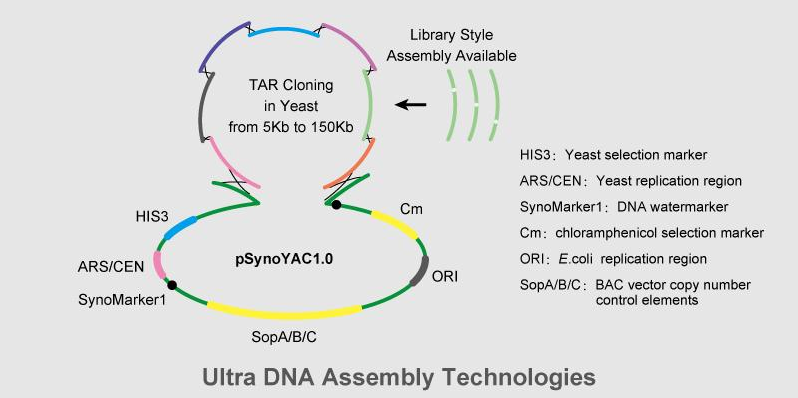What Does It Mean to Synthesize a Genome?
Genome synthesis refers to the process of artificially creating or reconstructing the complete set of genetic instructions of an organism, usually utilizing advanced biotechnology and synthetic biology techniques. The achievement of synthetic genomes has not only fulfilled the dream of creating life artificially but also deepened researchers' understanding of life. Moreover, it has provided better chassis cells for the production of both natural and non-natural products.
With the increasing length and complexity of synthetic genomes, the target organisms have covered viruses, bacteria and yeasts, and gradually expanded to higher-level eukaryotes organisms. However, as genome lengths increase from thousands of base pairs (Kb) to millions of base pairs (Mb), traditional DNA chemical synthesis techniques have struggled to keep pace with the advancements in genomics. A series of innovative DNA synthesis methods have emerged, aimed at addressing this challenge.
What are the Common Techniques for DNA Synthesis?
Common techniques for DNA synthesis includede novo oligonucleotide synthesis based on phosphoramidite chemistry, microchip-based oligonucleotide synthesis, enzymatic oligonucleotide synthesis, template-dependent and template-independent polymerase synthesis methods, as well as genome design and assembly technologies. These technologies play crucial roles in the field of genome synthesis, driving advancements in genetic engineering.
De Novo Oligonucleotide Synthesis Based on Phosphoramidite Chemistry
The fundamental principle of de novo oligonucleotide synthesis primarily relies on phosphoramidite chemistry, a method that involves step-by-step addition of nucleotides onto a solid-phase support. This technique achieves directional and controlled ligation of nucleotides through the alternating use of protecting and activating groups.
Traditional Technique: Column-based Synthesis
Column-based synthesis represents the first generation of oligonucleotide synthesis based on phosphoramidite chemistry. In this technique, oligonucleotide synthesis occurs within individual columns. Reagents are pumped through the columns to iteratively add nucleotides in a programmable manner.
Over the past decades, column-based synthesis has seen significant advancements, with commercially available column-based oligonucleotide synthesizers capable of synthesizing 96 to 768 oligonucleotides simultaneously, each containing 10 nmol to 2 µmol. However, column-based synthesis still struggles to meet the throughput and cost requirements of large-scale genome synthesis and DNA data storage.
Improved Technique: Chip-based Synthesis
Chip-based synthesis surpasses column-based synthesis in terms of throughput and cost. Based on the principles of phosphoramidite chemistry with minor modifications, chip-based synthesizers use active materials coupled to silicon plates for synthesis reactions. This selective deprotection of DMT-protected groups controls the synthesis of desired oligonucleotides at specific locations.
Compared to column-based synthesis, chip-based synthesis offers higher throughput and lower costs, making it more competitive in large-scale oligonucleotide synthesis.
Emerging Enzymatic Oligonucleotide Synthesis Techniques
Since 2016, multiple studies have demonstrated the feasibility of enzymatic oligonucleotide synthesis using template-independent or dependent polymerases. Enzymatic synthesis leverages the catalytic action of enzymes to synthesize oligonucleotides through iterative nucleotide addition.
Main Methods
-
Terminal Deoxynucleotidyl Transferase (TdT)-Mediated Synthesis:TdT is a template-independent DNA polymerase capable of adding nucleotides to the 3'-hydroxy termini of DNA strands. By developing synthetic and purification methods for 3'-O-cage-modified deoxyribonucleoside triphosphates (dNTPs), light-mediated deprotection enables TdT-mediated enzymatic oligonucleotide synthesis.
-
Template-Dependent Polymerase-Mediated Synthesis: This method uses template-dependent polymerases such as DNA polymerases or reverse transcriptases to synthesize oligonucleotides. Iterative elongation of oligonucleotides is achieved by step-wise addition of dNTPs or dNTP conjugates with reversible blocking groups.
Conclusion
Compared to chemical synthesis, enzymatic oligonucleotide synthesis offers mild reaction conditions, eliminates cumbersome protection and deprotection steps, and enables the synthesis of longer and more complex oligonucleotides. The capacity and efficiency of enzymatic synthesis of oligonucleotides are still lower than those of phosphoric acid amide chemical methods. Additionally, enzyme stability and activity are critical factors limiting the application of enzymatic synthesis. As technologies continue to advance and improve, these techniques will play increasingly important roles in fields such as genome synthesis and DNA data storage.
DNA Synthesis Expert | Synbio Technologies
At Synbio Technologies, the Syno GS Platform leverages yeast homologous recombination technology to provide one-stop services for gene synthesis, Genome synthesis, and large gene synthesis. We ensure that the delivered plasmids are assembled correctly to meet the needs of experiments and R&D. To uphold the highest standards, we guarantee 100% accuracy on all of our DNA plasmids. Contact us today to learn how we can meet your Genome synthesis needs.

Diagram of the synthesis and assembly platform of gene clusters and small genomes
References
[1]Song LF, Deng ZH, Gong ZY, Li LL, Li BZ. Large-Scale de novo Oligonucleotide Synthesis for Whole-Genome Synthesis and Data Storage: Challenges and Opportunities. Front Bioeng Biotechnol. 2021 Jun 22;9:689797.
[2]Wenfei Yu, Junbiao Dai, Yingxin Ma, Recent development on DNA & genome synthesis, Current Opinion in Systems Biology, Volume 37, 2024, 100490, ISSN 2452-3100.
 DNA Synthesis
DNA Synthesis Vector Selection
Vector Selection Molecular Biology
Molecular Biology Oligo Synthesis
Oligo Synthesis RNA Synthesis
RNA Synthesis Variant Libraries
Variant Libraries Genome KO Library
Genome KO Library Oligo Pools
Oligo Pools Virus Packaging
Virus Packaging Gene Editing
Gene Editing Protein Expression
Protein Expression Antibody Services
Antibody Services Peptide Services
Peptide Services DNA Data Storage
DNA Data Storage Standard Oligo
Standard Oligo Standard Genome KO Libraries
Standard Genome KO Libraries Standard Genome Editing Plasmid
Standard Genome Editing Plasmid ProXpress
ProXpress Protein Products
Protein Products
























